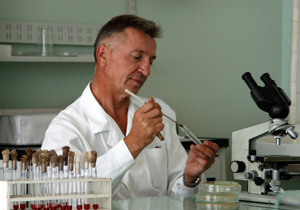Pathology

Following your first or subsequent visit to the surgeon, you may be asked to perform many tests, prescribed by your surgeon.Blood will be sent to a pathologist for examination. The pathologist determines the hormone receptor status by testing the tumor tissue.
Some of the more common blood tests are:
Full Blood Count (FBC) The hemoglobin level is checked and the different blood cells are looked at in detail under the microscope. Various forms of anemia are picked up as are viral infections like glandular fever. People on some medications require regular FBE’s.
Urea Electrolytes and Creatinine (UEC’s) This test is a measure of kidney function. We see an elevated serum urea or creatinine with dehydration or if the kidney function is impaired. The electrolytes are the various salts in the bloodstream, things like sodium, potassium, chloride and bicarbonate. The potassium level is of particular importance in people on diuretics or fluid tablets. Frequently, the level falls in these patients and oral potassium supplements are required.
Liver function tests (LFT’s) The levels of several liver enzymes rise markedly when the liver is damaged by infections like hepatitis, or by toxins like alcohol and certain drugs. Likewise, in a jaundiced patient where bile secretion from the liver is blocked, an elevated bilirubin level is seen. We also measure the protein and albumin levels; with chronic illnesses the albumin tends to gradually fall to quite low levels.
Cholesterol, triglyceride and other blood lipid levels: There is now no doubt at all that a high blood cholesterol level is an important risk factor for coronary artery disease. HDL-cholesterol seems to be protective and we like to see a higher level of this lipid. LDL-cholesterol appears a major factor in the development of coronary artery disease and we like to see a low level. Various ratios of HDL, LDL and total cholesterol are also used and may be more accurate predictors of coronary artery disease. Recent research suggests that an elevated triglyceride level is also significant and has to be taken into account.





